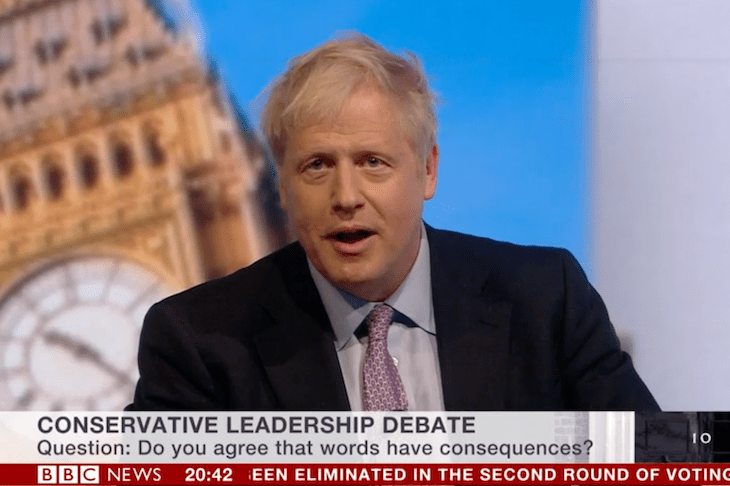If you’ve ever been in group therapy, you will have recognised many of the behaviour types in the BBC’s Tory leadership debate. There was Mr Avoidance (Boris Johnson), who kept his head down and let the clock run out, and Mr Calculating (Jeremy Hunt), who kept his interjections to a minimum and studiously ignored his rivals in favour of speaking directly to the inquisitive punters.
There was The Overachiever (Michael Gove), trying to one-up everyone by boasting about his achievements in government and his many plans to solve all of Britain’s ills. Sajid Javid was the Passive-Aggressive Snarker, agreeing with Gove here, jabbing Boris there, and mugging sceptically throughout Rory Stewart’s every answer. For his part, Stewart was the Obsessive-Compulsive Antagonist, unable to resist an opportunity to point out how different he was from the other candidates by slaughtering one Tory sacred cow after another.
So many personality disorders, so few personalities, and proceedings were not assisted by Emily Maitlis, who couldn’t decide whether she wanted to be a moderator or an interrogator and ended up the substitute teacher who couldn’t hack the problem class. The result was five shrill, shouty blokes and a testy presenter screeching over the lot of them. I don’t know if this is a sensible process for choosing a prime minister but it should terrify our enemies that we’re crazy enough to go about it this way.
One source of contrast between the five was the October 31 deadline for Brexit. Hunt and Gove were for it but with some flexibility if they managed to scare up a great deal in the final hours of Halloween. Javid said the deadline had to be a hard one and Boris waffled something vaguely to that effect too. Stewart didn’t want to focus on the date but rather the room we were all in and the door, which represented Brexit. Unlike his rivals, he was looking for the key, which was essentially giving Theresa May’s withdrawal agreement another go in the division lobbies. ‘We’ve already run into the door three times,’ Gove riposted.
Voters put their questions live via satellite. One from Northern Ireland asked but failed to get much of an answer on the backstop. Johnson said it could be solved during the transition period, Hunt talked up technological solutions, and Javid doubled down on his plan to buy off the Irish. Stewart’s response was the most memorable, not because he came up with a fix (he didn’t) but because it began: ‘Boris, I’m sure like me you’ve been in Enniskillen, sitting with a sheep farmer…’ He warned of the destructive impact of tariffs on agriculture, though Johnson insisted there would be none, but soon returned to his broader point: the EU granted an extension to pass the WA and would not negotiate a new deal before Halloween.
What ought to worry each of the campaigns, and the Tory party generally, is that their candidates were pretty solid on Brexit — it was everything else they faltered on. Carmella, a middle-class woman from Southhampton, said she was fearful of what a no-deal Brexit would mean for her husband, who works in the construction industry, and her three children, a mixture of professionals and undergraduates. Each would-be leader treated this as a political question about Brexit rather than a natural Conservative voter describing the possibility of her family losing their jobs. There was no empathy and no attempt to allay an angst that is widespread among middle-income professionals, the very demographic trending away from the Conservative party.
It is difficult to identify a winner from a rancorous, often incoherent hour but there was a clear loser. Rory Stewart crossed the line he has insouciantly tip-toed between truth-telling rebel wet and someone fundamentally unsuited to leadership of the Conservative party in 2019. He seemed hellbent on offending everything Tory MPs and members hold dear. ‘How,’ he demanded of Johnson. ‘How are you going to leave with no deal against the consent of Parliament?’
As the other four squabbled over whether the Tories should cut taxes for the rich or working joes, Stewart said: ‘I don’t think this is the time to be cutting taxes.’ Even when Lisa from Tunbridge Wells handed him an opportunity to promise more spending on mental health and special educational needs, he brought it back to the foolishness of easing the fiscal burden: ‘We do not need more tax cuts. If the money is there, it should be spent on public services’. Like Liz Kendall in the 2015 Labour leadership poll, Stewart is the most thoughtful, most honest, most prime-ministerial candidate on the ballot. He is fighting a good and creditable fight but it is one destined to end the same way.
The proceedings were loud but strangely bloodless, apart from Michael Gove’s occasional digs at Jeremy Corbyn, whom he accused of indulging in ‘anti-Semitic hate speech’ before addressing him directly as: ‘You discredited Marxist, get back in the bin where you belong.’ Even the prospect of said discredited Marxist getting his paws on the levers of power was unable to unite our potential prime ministers. Their disagreements are not primarily with him — though they regard him with revulsion — but with the realities of Brexit and the inescapable fact of a Conservative party that no longer sees itself as a single coherent tribe. The therapy isn’t working and this leadership contest feels like a diversion from a split that must eventually come.







Comments